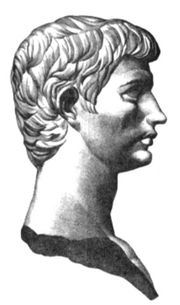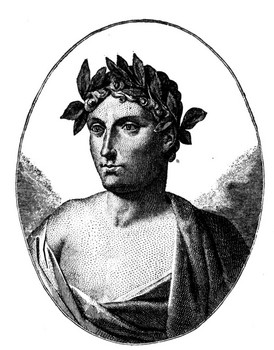
Marcus Junius Brutus |
Brutus & Horace
Reflections after Reading Pinsky's
Notes by Peter Y. Chou |

Quintus Horatius Flaccus |
|
Preface: Robert Pinsky was kind enough to let me in his class "The Occasions of Poetry"
on Wednesday, January 10, 2007. I've not read much of his poems, except glancing through some
of his translation of Dante's Inferno. So browsing through the Stanford stacks, I came
across his book An Explanation of America (1979). What an interesting title! I've been
trying to do this myself in my poem "Dove of Discovery".
When I realized that Columba is the Latin word for dove, all sorts of images flooded
my mind— Noah, Christ, Jason and the Argonauts, discovery of America by Columbus,
the District of Columbia with possibly Lady Columbia on top of the Capitol Building, Founding
Fathers at Columbia University who were Freemasons, Emily Dickinson's "My brave Columba". I was
curious to see whether Pinsky was aware of the dove symbol to America, and was disappointed in not
finding any. However I was profoundly disturbed to learn about two figures in Roman history—
Horace, the Roman poet whom I admire deeply, and Brutus, one of Julius Caesars assassins, whom I
loathed as a traitor. This was especially true after seeing Joseph Mankiewicz's film
Cleopatra last month
at the Stanford Theatre, when Rex Harrison, playing Caesar was repeated stabbed by Brutus and others
on the Ides of March 44 B.C.
Brutus as portrayed in the film appeared a slimy character indeed. I wondered why Pinsky
portrayed Brutus in a more favorable light. Is a poet's version more accurate than that
of a film director? I want to expand my knowledge on the historical Brutus and Horace.
Below is my 8-hour research for today in the Stanford stacks.
|
|
Robert Pinsky, An Explanation of America, Princeton University Press, Princeton, NJ, 1979 Part Two: Its Great Emptiness (pp. 36-40) Stanzas 5-12, 15 of 16-stanzas poem cited below: IV. Filling the Blank
On March, when Horace, not quite twenty-one, What surprised me in Pinsky's poem was that Horace joined Brutus, the traitor, to Asia. And so did Cicero's son! One of my favorite quotes is from Horace: "Be bold— and venture to be wise." I've taken this maxim to guide my life when I was in college, and linked it to one of my wisdom stories— The Boldness of Huh Saeng. Horace's Ars Poetica emphasized clarity, unity, and vigor in a work of art. The "Ars Poetica" and its Tradition is the subject of a book by O. B. Hardison, Jr. & Leon Golden Horace for Students of Literature (1995). Poets influenced by Horace include Alexander Pope's Essay on CriticismThe Progress of Poesy (1757), George Lord Byron's Hints from Horace (1811), Tennyson's The Palace of the Arts (1832), Paul Verlain's Ars poétique (1874), and Wallace Stevens's Notes Toward a Supreme Fiction (1942). I've alway admired Cicero and his cosmic vision in his The Dream of Scipio. How could his son educated by such an enlightened father join the brigade of Brutus along with Horace? Dante had included Horace as having "earned Heaven's grace" (Inferno IV.78) while Brutus was tossed into the deepest Hell (Inferno XXXIV.61-69). Here's Dante's account of Horace among the four master poets of ancient times when he was accompanied by Vergil (Inferno IV.88-90):
Dante's portrays Brutus as three of the world's greatest villians— Judas Iscariot, Brutus, and Cassius— being tortured in Hell by Satan. (Inferno XXXIV.88-90):
Pinsky wrote An Explanation of America in 1979 and translated Dante's Inferno in 1994. I'm excited to read his commentary on these two Roman figures in his The Inferno of Dante. I find a copy of his book in the Stanford stacks [PQ4315.2P47.1994]. Turning to Pinsky's Notes in the back of the book (p. 383), he mentions that Dante could not read Greek, so his knowledge of Homer was through translations. He cites the works of the three Latin poets— Horace (Epistles, Ars Poetica, Satires, Odes), Ovid (Metamorphoses), Lucan (Pharsalia). Pinsky's comments on Inferno XXXIV.65-66: "In 44 B.C., Marcus Junius Brutus and Gaius Cassius Longus conspired to kill Julius Caesar. Their crime was seen in the Middle Ages as an offense not only to the murderers' great benefactor, but to the progress and history of the Roman Empire and the Church." (p. 426) Dorothy Sayers in her translation of Dante's Divine Comedy: Hell (1949) has more to say on Judas, Brutus, and Cassius: "Judas, obviously enough, is the image of the betrayal of God. To us, with our minds dominated by Shakespeare and by "democratic" ideas, the presence here of Brutus and Cassius needs some explanation. To understand it, we must get rid of all political notions in the narrow sense. We should notice, first, that Dante's attitude to Julius Caesar is ambivalent. Personally, as a pagan, Julius is in Limbo (Inferno IV.123). Politically, his rise to power involved the making of civil war, and Curio, who advised him to cross the Rubicon, is in the Eighth Circle of Hell (Inferno XXVIII.97-102). But, although Julius was never actually Emperor, he was the founder of the Roman Empire, and by his function, therefore, he images that institution which, in Dante's view, was divinely appointed to govern the world. Thus Brutus and Cassius, by their breach of sworn allegiance to Caesar, were Traitors to the Empire, i.e., to World-order. Consequently, just as Judas figures treason against God, so Brutus and Cassius figure treason against Man-in-Society; or we may say that we have here the image of treason against the Divine and the Secular government of the world." (p. 289) [PQ4315.S32.1964v.1]
Charles Singleton commentary on Brutus's life in Inferno XXXIV.65 Bruto:
Charles Singleton's commentary on Brutus in Hell is quite discerning.
Had I read Pinsky's account of Horace and Brutus in a historical novel, I may
suspect the fiction writer's tinkering with facts with fantasy. But a poet must
be truthful, so I wanted to find the sources that prompted Pinsky's poem. Since
Pinsky mentions Plutarch's account of Brutus, I trust this source since Plutarch
(46-127 A.D.) was the last Priest at the Oracle at Delphi, and I consider him
an enlighened sage who understood the Eleusian Mysteries. I eagerly looked up
Plutarch's Makers of Rome (translated by Ian Scott-Kilvert, 1965)
[DG260.A1P53]. In Plutarch's Nine Lives of Famous Romans, he has a chapter on
Brutus (pp. 223-270). I found the story of Antony's respect for Brutus:
"When Antony found Brutus's body, he ordered it to be wrapped in the most
costly of his scarlet cloaks, and afterwards when he discovered that the garment
had been stolen, he had the thief put to death. The ashes he sent home to Servilia,
Brutus's mother. As for Porcia, Brutus's wife, both Nicolaüs the philosopher
and Valerius Maximus tell the story that she now longed to end her life, but was
prevented by her friends who sat with her and continually watched her. So she
contrived to snatch up some live coals from the fire and swallowed them, keeping
her mouth closed, and so suffocated herself and died." (p. 269)
The reference to Maecenas's friendship to Horace in Pinsky poem may be found
in The Life of Horace by the Roman historian Suetonius (69-130 A.D.):
Pat Southern, Mark Antony (1998) [DG260.A6.S68.1998]
M. L. Clarke, The Noblest Roman: Marcus Brutus and His Reputation (1981)
Pinsky's poem relating to Horace and Brutus led me to explore
further on these two Roman figures from antiquity. Now, I trust Pinsky's version
more than that portrayed by Mankiewicz in his film. What a blessing to have
a computer workspace in the Classics Room at Stanford Green Library! Books on literature
and philosophy are just paces away. I find answers in them faster than searching
in Google. After typing up the notes on Brutus and Horace
from books in the Stanford stacks, I returned again to Pinsky's poem
An Explanation of America. After reading about the simple and humble
Jefferson's epitaph (pp. 53-54),
I found an even more inspiring one on page 55:
To speak words few enough to fit a stone,
I'm glad to have read Pinsky's An Explanation of America. |
| Top of Page
| Haikus
| Apollo Belvedere
| Goethe on Michelangelo
| Goethe on Rubens |
| Goethe on Literature
| Goethe on Gaia
| Goethe's Faust
| Art & Spirit
| Art Quotes |
| Art Books
| Books to Read
| Poetry
| Monet
| Delacroix
| Renoir
| Rodin
| Home |
| © Peter Y. Chou,
Wisdom Portal P.O. Box 390707, Mountain View, CA 94039 email:  (1-14-2007) (1-14-2007) |
|